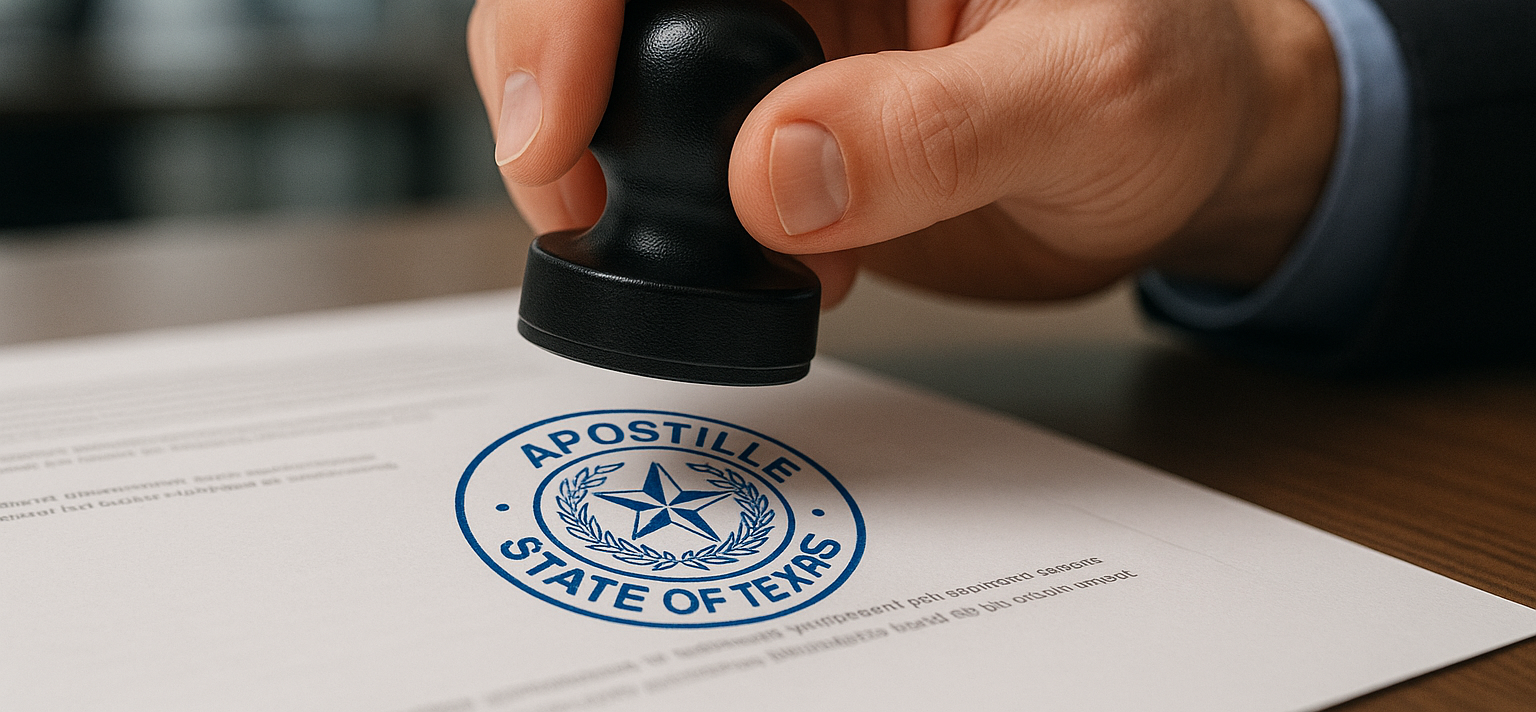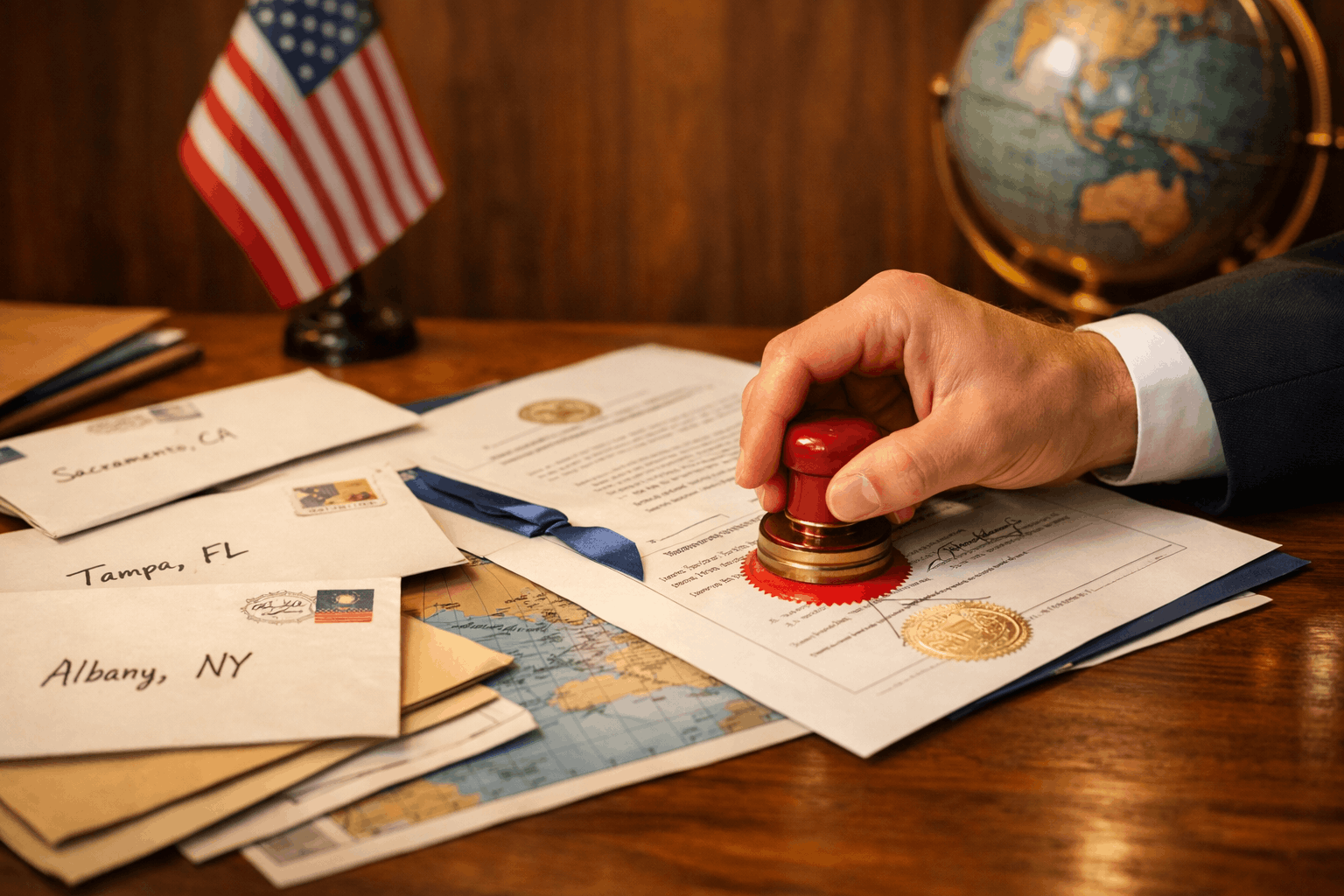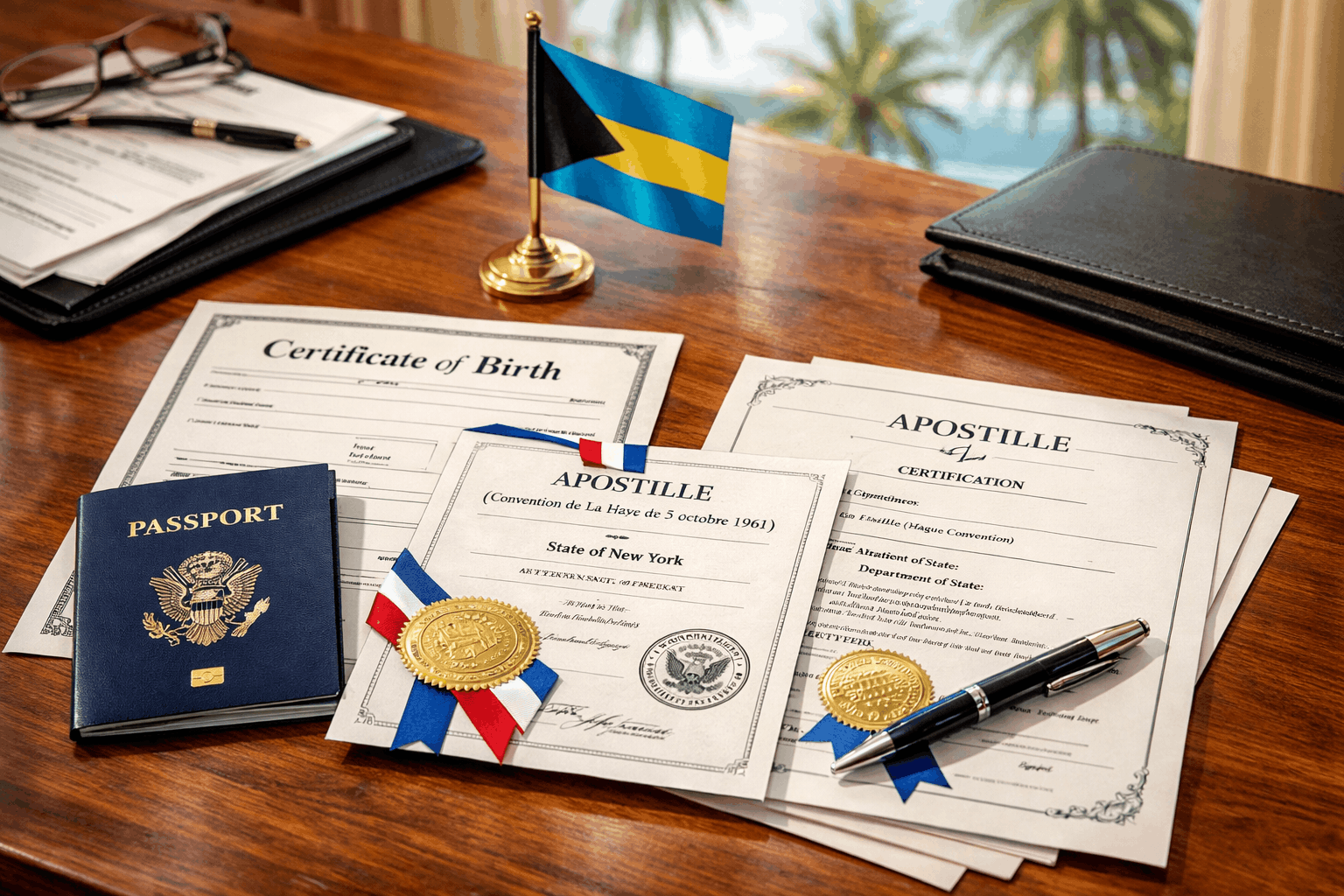
How to Apostille a Document in Texas: Step-by-Step Guide
Knowing how to apostille a document in Texas is essential when planning an international endeavor from home. The Texas apostille process might be confusing for those getting married, studying abroad, or doing business overseas at first, but with a step-by-step guide, things will become increasingly simple.
In this post, we’ll discuss everything you should know about obtaining a state-level apostille in Texas, from document eligibility to common mistakes to avoid. You’ll be equipped with actionable advice to have your papers authenticated smoothly without stress or setback. Ready to dive in? Let’s make your documents valid for the global stage now!
Types of Documents You Can Apostille in Texas
Before looking closer into the step-by-step process, it’s crucial to note that not all document types are eligible for a Texas apostille. Determining which papers qualify helps you sidestep hurdles and rejections. Here’s what you can authenticate through the apostille:
Vital Records
Suppose you need an apostilled birth certificate in Texas to prove your identity and birthplace for immigration purposes. Congratulations, you’re eligible to request an apostille. Most vital records, including birth and death certificates, marriage licenses, and divorce records, qualify for this authentication method. These documents should be certified copies from the Texas Department of State Health Services’ Vital Statistics Section or the county clerk’s office.
Educational Documents
Need to submit a diploma to study abroad? Obtaining an apostille for educational documents in Texas is essential to validate your credentials overseas. This type of paperwork includes diplomas, transcripts, and certificates issued by academic institutions within the state borders. For instance, many European universities demand that you apostille your highest academic degree for admission. Securing one ensures all your educational achievements are recognized without issue.
Business and Corporate Documents
Many business documents are required for conducting commercial activities overseas, from registering a company to signing an international contract. Examples of this type include articles of incorporation, partnership agreements, and board resolutions. Imagine you open a branch in Germany — you likely need to apostille the article of incorporation to demonstrate your company’s legal status.
Notarized Personal Affidavits or Letters
Don’t forget that even personal paperwork sometimes needs international validation. When you send a sworn statement or authorization letter abroad, it’s vital to apostille the paper first. Typically, these documents are notarized by a Texas commissioned notary public before authentication processing. A single parent traveling with their kid to a foreign country is often required to present a parental consent form apostille. Consider getting one early for a smooth journey!
Step-by-Step Guide to Getting an Apostille in Texas
Understanding the Texas apostille process inside out can save you from facing hurdles. This section will walk you through every stage, from identifying document type to tracking process status, so you’ll navigate each without the guesswork. Follow the below steps precisely to prevent unnecessary resubmissions and delayed plans:
Step 1: Identify the Document Type and Issuing Authority
You first need to play detective with your papers by determining two key things: what type of document it is and which authority issued it. So, why does it matter? Each document type might require certification or notarization differently. For instance, birth certificates usually come from the Texas Department of State Health Services, while academic diplomas should be certified copies from the schools. Hence, completing this step allows you to follow the right authentication path.
Step 2: Get the Document Notarized
Notarization is a prerequisite for certain documents, including affidavits and business contracts, so make sure you notarize them properly. Determine if notarization is required and find a Texas notary public to witness signatures and affix their seal. It’s important to check whether the notary is in good standing — minor mistakes may cause you to start all over again.
Step 3: Complete the Texas Apostille Request Form 2102
Next, it’s time to tackle the application — fill out the apostille form 2102, also known as the Apostille Request Form. Basically, this document provides your details, including:
- Contact information
- Destination country
- Document description
- Preferred return method
Download the updated form from the official website and double-check everything carefully before submission. An incomplete form might result in rejection, so take your time to enter the required information and avoid potential delays.
Step 4: Submit to the Texas Secretary of State
Send your prepared document, completed application form, and payment to the Texas Secretary of State apostille unit. Submissions might be done by mail or walk-in at the Austin office. If you opt for the mail-in option, make sure you include a self-addressed return envelope and use a trackable courier. Also, for time-sensitive cases, it’s advisable to submit your apostille request through third-party services to get quick and affordable apostille approvals.
Step 5: Pay Fees and Track the Status
You’re almost there! As the last step, remember to include appropriate processing fees in your apostille request, whether as a check or money order enclosed with the mailing package or by swiping your credit card directly at the authentication office. Additionally, monitor processing status on the official website and track to ensure your paper doesn’t get lost in transit. Now, you’re all set for your international adventure!
Real Examples of Apostille Use in Texas
Now that you know all the critical steps, seeing some real-world scenarios will bring them to life. Exploring how people use their apostilles to adopt children overseas or apply for student visas enables you to uncover practical lessons. Let’s get a bigger picture of what the apostille provides for your global goals.
Apostille for International Adoption
When adopting a child from a Hague Convention country, parents often need to submit documents, such as a Texas apostilled marriage certificate, home study report, and criminal background check. Authentication procedures like the apostille ensure documents are authentic and fulfill the legal requirements of the child’s country of origin. By apostilling the paperwork accordingly, families can welcome their child from overseas without bureaucratic hassles getting in the way.
Working Abroad with a Texas Power of Attorney
Are you heading overseas for legal matters — managing a property on someone’s behalf or getting authorized to handle business affairs? A Texas Power of Attorney (POA) apostille allows you to work across borders without worrying about international recognition of your paperwork. Many Austin entrepreneurs have used apostilled POAs to streamline administrative tasks abroad, reducing the risk of document rejections and protecting their interests in another country.
Student Visa Applications with a Texas Transcript Apostille
Applying for a student visa often comes with authenticated proof of academic history. A Texas transcript apostille helps verify your academic credentials, allowing for a successful visa application to move abroad and enroll in foreign programs. Failing to secure one, the embassy or consulate may decline your visa application or require you to resubmit the apostille, resulting in unnecessary delays and back-and-forth communication.
Common Mistakes to Avoid During the Apostille Process
Small errors might derail the entire apostille process — notary mishaps or wrong payment, for instance. Before submission, spend some time going through the following common pitfalls and discovering useful tips to sail through authentication smoothly. Here’s what people mostly stumble upon when tackling the apostille process in Texas:
Submitting Photocopies Instead of Certified Originals
The Secretary of State will reject your request if you send in photocopies. Vital records must have certified seals from the issuing authority, such as the county clerk or the Vital Statistics. Hence, remember that the apostille process only accepts original documents or certified copies from proper agencies. Submitting unqualified scans or photocopies will put a halt to your trip!
Using Out-of-State Notaries
Texas rejects all papers notarized outside the state borders — a common trap many people fall into. To obtain a state-level apostille, the notarization must be done by a commissioned notary public in that same state. Thus, if your document is notarized in another state, it won’t qualify for a Texas apostille. That said, professional services are available to support you in getting an apostille from another state, covering nationwide, no matter where your document was issued.
Forgetting Payment or Using the Wrong Fee Amount
Overlooking payment or submitting an insufficient amount is a frequent hiccup during the apostille process. That’s why it’s important to check the processing fee on the official website beforehand and make sure your payment method is valid. For instance, you can’t send cash with your apostille package when using the mail-in option. Attach a check or money order instead to ensure your request is processed without complication.
Sending Incomplete or Incorrect Forms
Using an outdated apostille request form might result in outright rejection, so only download it from the official website. Additionally, missing a required field, such as destination country or current address, might cause troubles and delays. Hence, fill out the apostille form 2102 thoroughly and double-check to see if there is any typo or mismatched information afterwards. Putting “Europe” into the destination box instead of a country name could lead to your request being turned down.
Apostille Processing Time and Fees in Texas
The state charges $15 per document, with multiple payment methods accepted (credit card, check, and money order). Regular Texas apostille processing time is 3–5 business days, excluding mailing time.
- Mail submissions: Up to 4 weeks from the date of receipt
- Walk-in service: Same-day process available, with wait times varying
For urgent or complex matters, you can always use expedited options offered by private services for an extra fee to speed up the process.
One Last Check Before You Apostille
You’re now prepared with all the essentials about the apostille process. Before sealing your apostille request envelope, let’s run through the final Texas apostille checklist below:
- Original or a certified copy
- Proper notarization, if applicable
- Completed form 2102 with all required information
- Accurate payment covering the processing fee
Need extra help for a flawless submission? Our team specializes in professional Texas apostille services, ensuring you get every detail right for global acceptance. Reach out today for personalized advice!
FAQs
Can I get a Texas apostille for a document issued in another state?
No, Texas only issues apostilles for documents that originate within the state. If your document, like a birth certificate, was issued in another state, you’ll need to request an apostille from that state’s Secretary of State or an equivalent authority.
Can I apostille a scanned or PDF version of a document?
Unfortunately, the Texas Secretary of State doesn’t accept scanned or digital copies, including color ones. They only process physical documents, either the original or certified copies, issued by authorized agencies.
What if my document is in another language?
Texas apostilles verify signatures and seals rather than content. Thus, it doesn’t matter if your record is in another language, as long as it was issued and certified or notarized in Texas. However, some foreign countries demand a certified translation attached to the apostilled document, so make sure you check the specific requirements of the receiving country.
Can I apostille a criminal background check from Texas?
Yes, as long as the criminal background check was issued by one of the state law enforcement agencies, such as the Department of Public Safety. Otherwise, FBI background checks must be submitted to the Department of State for federal apostilles.
Can I walk into the Austin office for same-day service?
Yes, the Austin office offers same-day service for walk-in apostille submissions. However, be aware of the long queue and arrive early to get your apostille before closing hours. Also, remember to bring all required documents and complete the request form at home in advance.





